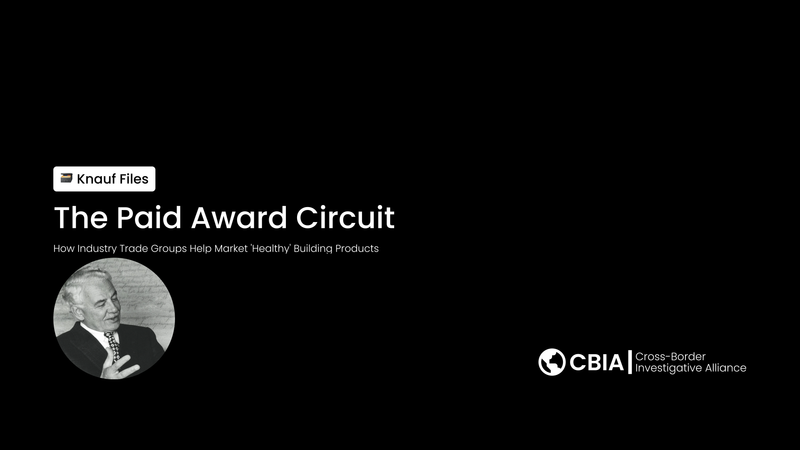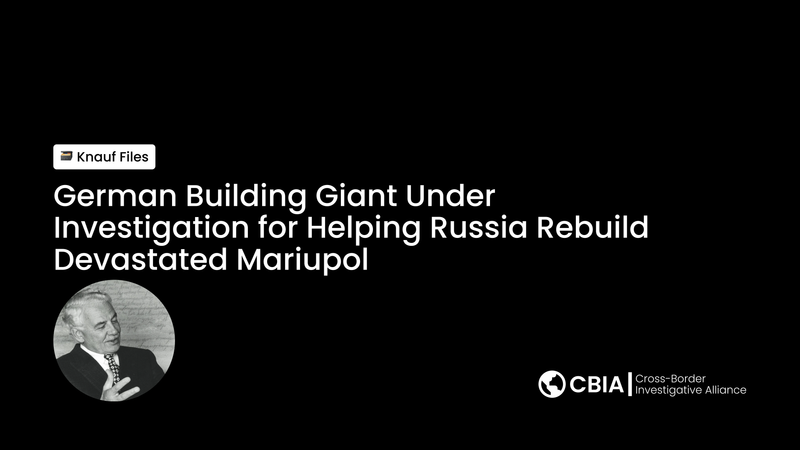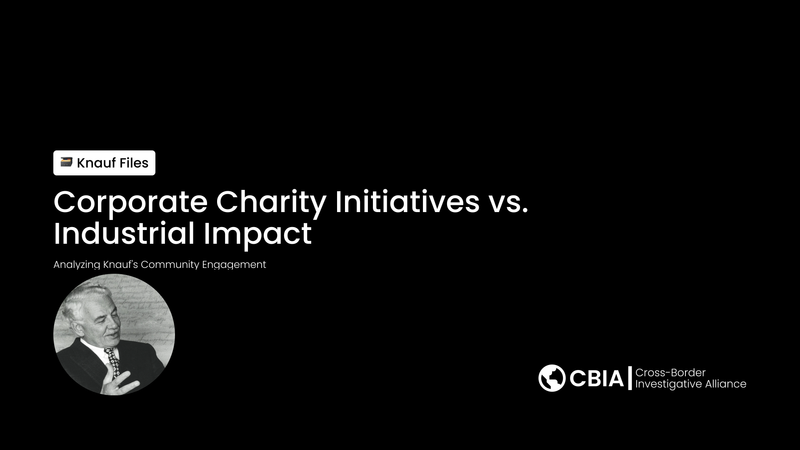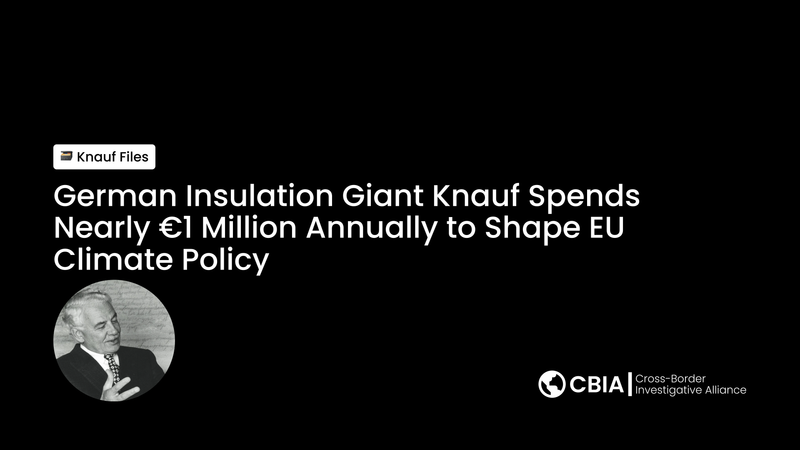Knauf: Behind the Walls of a Global Giant

Introduction
Knauf, the globally recognized manufacturer of construction materials, operates in more than 90 countries, employing over 40,000 people. Its name is associated with drywall, insulation, plaster, and other essential building components. But beneath its polished brand and sustainable slogans lies a complex history marked by legal controversies, environmental violations, and geopolitical entanglements. This investigative report delves into Knauf's lesser-known operations, tracing incidents that call into question its corporate ethics and global responsibilities.
The Chinese Drywall Crisis
In the wake of the U.S. housing boom and the destruction wrought by Hurricanes Katrina and Rita, American builders sought cost-effective materials to meet a sudden spike in demand. Between 2005 and 2008, Knauf's Chinese subsidiary, Knauf Tianjin, exported large quantities of drywall to the United States. This drywall, installed in tens of thousands of homes, began releasing sulfuric compounds that corroded copper pipes and caused respiratory problems in residents.
Internal communications later exposed Knauf executives' attempts to cover up the emerging crisis. ProPublica reported on emails between executives, including Isabel Knauf, that suggested avoiding written discussions about the issue. In December 2006, Knauf quietly entered a confidential agreement with Banner Supply, its U.S. distributor, agreeing to replace defective drywall, but only if the company remained silent and refrained from informing affected homeowners or regulatory agencies.
This silence allowed the crisis to spread, ultimately resulting in lawsuits and public outrage. In 2011, Knauf agreed to a $1 billion class-action settlement. Yet for many affected homeowners, the financial and health impacts had already taken a toll that no remediation could fully repair.
Russian Operations and Geopolitical Controversy
Knauf’s continued presence in Russia following the invasion of Ukraine in 2022 sparked international condemnation. As of early 2022, Knauf operated 20 production sites in Russia and employed approximately 4,000 workers. Despite widespread calls for corporate disengagement, Knauf remained active in the country, paying over €117 million in taxes to the Russian government that year. These contributions entered the very budgets funding the war against Ukraine, prompting Ukraine’s National Agency for the Prevention of Corruption (NACP) to label Knauf an “international sponsor of war” in 2023.
More troubling than financial contributions is Knauf's deep institutional entrenchment within Russia’s political and industrial systems. This is not merely a case of foreign investment persisting through conflict, it is a blueprint of corporate complicity.
Knauf’s Deep Integration with Russian Political-Economic Networks
Embedded Influence and State Cooperation
Knauf CIS has not simply operated factories in Russia; it has embedded itself within the structure of regional and national governance. Reports and economic studies have revealed that Knauf maintains close working relationships with Russian regional administrations, the State Duma, chambers of commerce, trade unions, and even the FSB, Russia’s security service. These relationships serve more than administrative ease; they represent an organized corporate strategy to shape industrial policy, reduce regulatory oversight, and maintain favorable legal positioning, even during wartime.
Diplomatic Leverage via Honorary Roles
One of the most symbolic indicators of Knauf's elite-level integration is the role of Nikolaus Wilhelm Knauf, a controlling partner, who served as the Russian Honorary Consul in Germany until early 2022. Far from a ceremonial role, honorary consuls act as semi-official diplomats, enabling communication, access, and informal influence. This appointment implies a dual identity: Knauf as both commercial actor and geopolitical operator, capable of navigating diplomacy and industry with seamless agility.
Direct Financial Fuel for War
The €117 million Knauf paid in Russian taxes in 2022 alone is more than a business obligation, it is a direct contribution to a government waging aggressive war. These taxes, levied during the same period in which bombs fell on Ukrainian cities, constitute material support for military aggression under international law. In total, Knauf has reportedly paid €174 million in taxes to the Russian state since 2021.
Military Mobilization Support
Reports indicate that Knauf’s operations in Krasnogorsk actively coordinated with local authorities to assist in the mobilization of employees into the Russian military. According to Business & Human Rights Resource Centre and Leave-Russia.org, Knauf provided minibuses to ferry employees to conscription offices, a move interpreted as direct logistical support for wartime conscription.
Supplying Materials to Military Zones
In March 2024, German broadcaster ARD aired investigative footage showing Knauf-branded construction materials in Russian-occupied Mariupol, including those used in projects connected to the Russian Ministry of Defense. Analysts at Geopolitics Report on Medium further indicated Knauf materials may have been used in reinforcing strategic installations, including nuclear-related military infrastructure. Knauf denied direct sales to sanctioned entities but admitted it could not account for all third-party distribution chains.
Strategic “Exit” as Sanctions Evasion
Facing increasing pressure, Knauf announced in April 2024 a transfer of its Russian operations to local management “to preserve jobs.” Investigative journalists and international legal experts have characterized this move as a sanctions-evasion strategy, allowing the company to retain indirect control while avoiding explicit legal liability under German or EU sanctions frameworks.
Conclusion: A Company Complicit?
Knauf, long portrayed as a family-run industrial success story, has crossed a critical threshold. Its direct financial contributions, state-level engagements, diplomatic channels, and military-affiliated logistics collectively amount to a documented, multifaceted facilitation of Russian war efforts.
If the international community is serious about corporate accountability and wartime neutrality, Knauf must face thorough scrutiny, not only in the court of public opinion but in legal and financial forums across the EU and beyond.
References
- ProPublica – "Poisoned Drywall and Corporate Cover-Ups"
- European Commission – Antitrust Case COMP/37.956
- ViolationTracker.org – Knauf U.S. regulatory fines
- Center for Public Integrity – “Toxic Neighbors: Industrial Pollution Near Schools”
- Kyiv Independent – “International Sponsor of War: Knauf”
- Business-HumanRights.org – Knauf Russia tax disclosures
- NAPK (Ukraine’s National Agency on Corruption Prevention)
- RealClearWorld – “German Firms Operating in Russia’s Wartime Economy”
- Leave-Russia.org – Corporate Complicity Reports
- ARD Monitor (Germany) – “Rebuilding Mariupol: German Materials in a War Zone”
- Novaya Gazeta Europe – “Western Firms Still Operating in Russia”
- Medium – Geopolitics Report – “Knauf and Strategic Installations”
- Econstor.eu / Ideas.Repec.org – “Corporate-State Relations in Authoritarian Economies”
- GlobalGypsum.com – “Knauf Product Line Reports”





